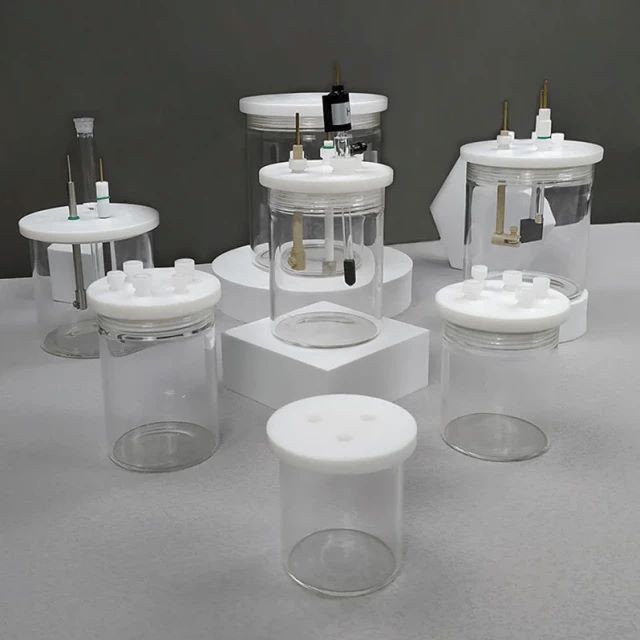
Electrochemical Consumables
Electrolytic Electrochemical Cell with Five-Port
Item Number : ELC
Price varies based on specs and customizations
$12.99 / set
- Specification
- 10ml~1000ml
- temperature range
- 0~60℃
- Material
- Boron glass, PTFE
Shipping:
Contact us to get shipping details Enjoy On-time Dispatch Guarantee.
Why Choose Us
Easy ordering process, quality products, and dedicated support for your business success.
The sealed and non-sealed electrolytic cells come with a three-electrode system that can be either pre-punched or customized to meet your specific requirements.
Technical specifications
Sealed electrolytic cell
| Specification | 10ml~1000ml |
| Applicable temperature range | 0~60℃ |
| Sealed form | Thread / Apron |
| Material | Boron glass, PTFE |
| Openings in the electrolytic cell | Three electrode holes (6mm) and Two air holes (3mm), can be customized |
Unsealed electrolytic cell
| Specification | 10ml~1000ml |
| Applicable temperature range | 0~60℃ |
| Material | Boron glass, PTFE |
| Openings in the electrolytic cell | Three electrode holes (6mm), can be customized |
Detail & Parts
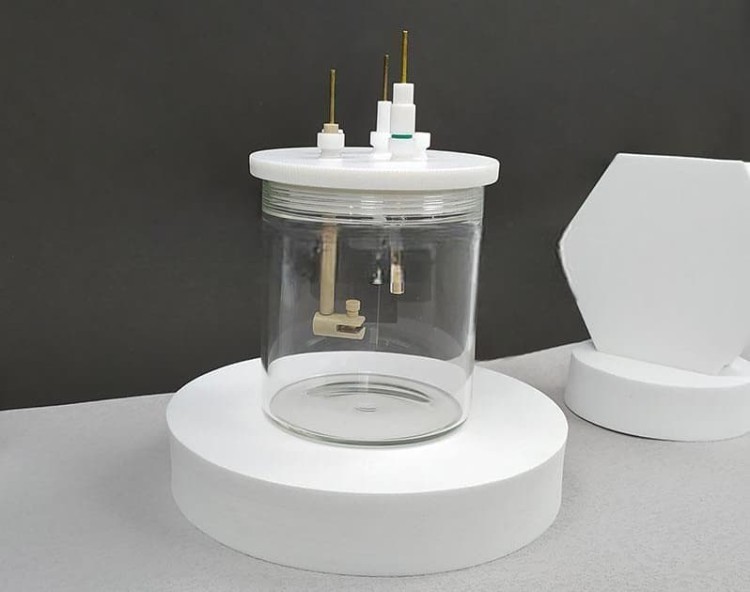
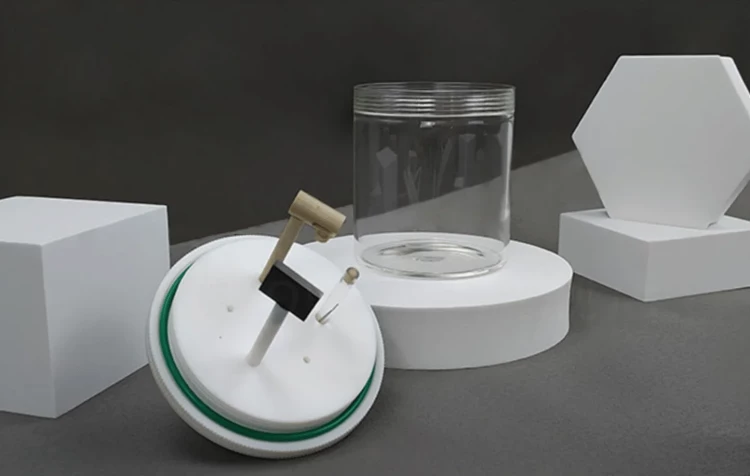



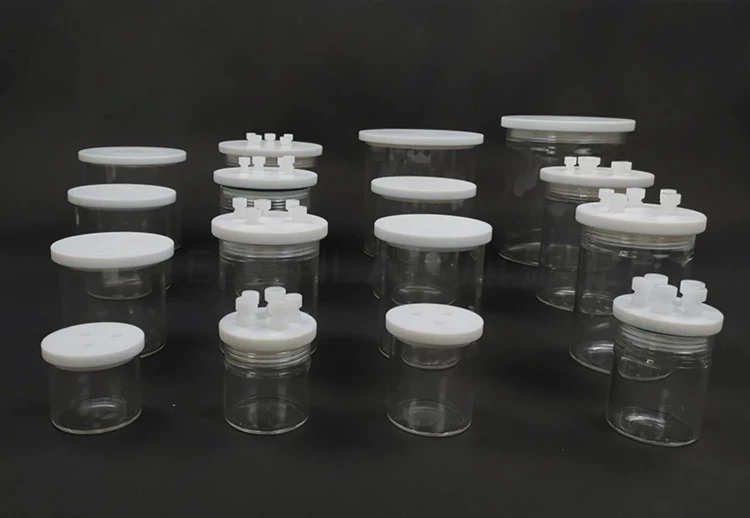
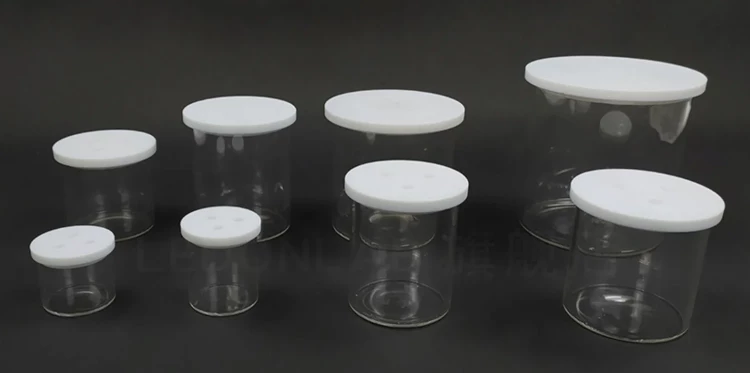
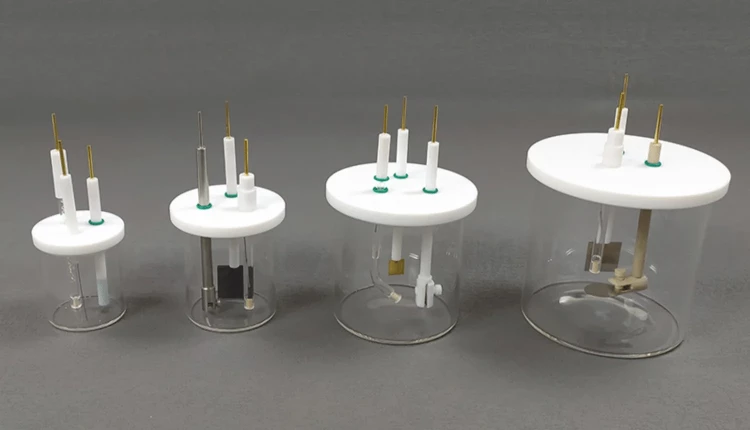
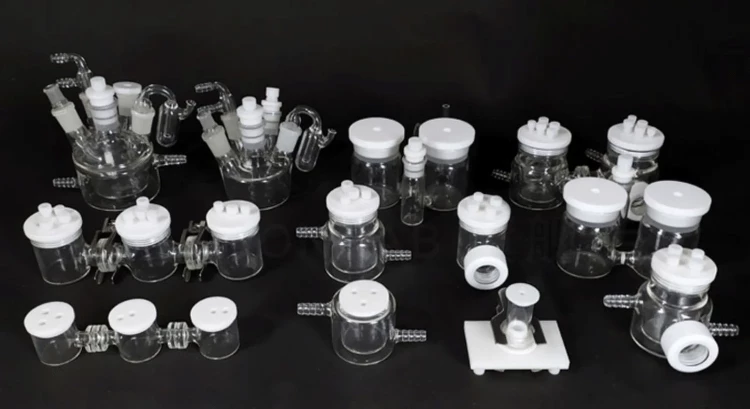
Operating steps
Sealed electrolytic cell installation

1. The sealed electrolytic cell is composed of a sealing rubber ring, a sealing plug, a PTFE cover and a cell body

2. When installing, insert the electrode and gas pipe into the electrolytic cell and install the sealing ring

3. Install the sealing nut of the electrode and air hole on the electrode, squeeze the sealing ring and rotate the nut to tighten

4. Install the large sealing ring on the pool body, and completely clamp the sealing ring on the cover to ensure that the sealing ring is firmly locked

5. The installation of the three-electrode electrolytic cell is completed
Unsealed electrolytic cell installation

1. The non-sealed electrolytic cell consists of a fixed ring, a PTFE cover and a cell body

2. When installing, put the electrode on the rubber ring and place it on the cover
Designed for You
KinTek provide deep custom made service and equipment to worldwide customers, our specialized teamwork and rich experienced engineers are capable to undertake the custom tailoring hardware and software equipment requirements, and help our customer to build up the exclusive and personalized equipment and solution!
Would you please drop your ideas to us, our engineers are ready for you now!
Trusted by Industry Leaders

FAQ
What Are Electrolytic Cells Used For?
What Are The Materials Used In Electrochemical Cell?
What Is An Electrode In Electrochemistry?
What Is The Difference Between Galvanic Cell And Electrolytic Cell?
What Are The Examples Of Electrochemical Material?
What Are The 3 Electrodes In Electrochemistry?
What Is An Electrolytic Cell And How Does It Work?
What Are The Different Types Of Electrochemical Electrodes?
What Are The Two Points Of Difference Between Electrochemical And Electrolytic Cells?
What Materials Are Commonly Used For Electrochemical Electrodes?
What Is The Example Of Electrolytic Cell?
What Factors Should Be Considered When Selecting An Electrochemical Electrode?
Are Electrolytic Cells Spontaneous?
How Can Electrochemical Electrodes Be Used In Various Applications?
4.8 / 5
This electrolytic cell is a lifesaver! The delivery was beyond fast, and the quality is top-notch. It's durable and technologically advanced, making my lab work a breeze.
4.9 / 5
I'm thoroughly impressed with this electrolytic cell. The value for money is unbeatable, and the quality is exceptional. It's a game-changer for my laboratory.
4.6 / 5
This electrolytic cell exceeded my expectations. It's incredibly durable and technologically advanced, making it a valuable asset to my laboratory. Highly recommended!
4.7 / 5
I'm beyond satisfied with this electrolytic cell. The delivery was surprisingly fast, and the quality is impeccable. It's a testament to the company's commitment to excellence.
4.8 / 5
This electrolytic cell is a must-have for any laboratory. The quality is superb, and the durability is unmatched. It's an investment that will pay off in the long run.
4.9 / 5
I'm highly impressed with this electrolytic cell. The technological advancements are remarkable, and the quality is exceptional. It's a testament to the company's dedication to innovation.
4.7 / 5
This electrolytic cell is simply amazing. It's durable, technologically advanced, and incredibly easy to use. I highly recommend it to anyone looking for a top-notch product.
4.8 / 5
I'm thoroughly satisfied with this electrolytic cell. The delivery was lightning fast, and the quality is impeccable. It's a valuable addition to my laboratory.
4.9 / 5
This electrolytic cell is a game-changer for my laboratory. The value for money is exceptional, and the quality is outstanding. It's a must-have for any serious researcher.
4.6 / 5
I'm highly impressed with this electrolytic cell. It's durable, technologically advanced, and incredibly user-friendly. I highly recommend it to anyone looking for a top-notch product.
4.7 / 5
This electrolytic cell is simply amazing. The delivery was incredibly fast, and the quality is impeccable. It's a valuable addition to my laboratory.
4.8 / 5
I'm thoroughly satisfied with this electrolytic cell. The value for money is exceptional, and the quality is outstanding. It's a must-have for any serious researcher.
4.9 / 5
This electrolytic cell is a game-changer for my laboratory. The technological advancements are remarkable, and the quality is exceptional. It's a testament to the company's dedication to innovation.
4.7 / 5
I'm highly impressed with this electrolytic cell. It's durable, technologically advanced, and incredibly easy to use. I highly recommend it to anyone looking for a top-notch product.
4.8 / 5
This electrolytic cell is simply amazing. The delivery was lightning fast, and the quality is impeccable. It's a valuable addition to my laboratory.
4.9 / 5
I'm thoroughly satisfied with this electrolytic cell. The value for money is exceptional, and the quality is outstanding. It's a must-have for any serious researcher.
4.6 / 5
I'm highly impressed with this electrolytic cell. It's durable, technologically advanced, and incredibly user-friendly. I highly recommend it to anyone looking for a top-notch product.
REQUEST A QUOTE
Our professional team will reply to you within one business day. Please feel free to contact us!
Related Products
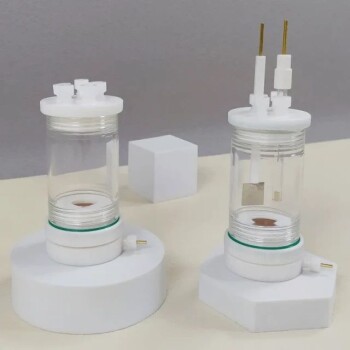
Multifunctional Electrolytic Electrochemical Cell Water Bath Single Layer Double Layer
Discover our high-quality Multifunctional Electrolytic Cell Water Baths. Choose from single or double-layer options with superior corrosion resistance. Available in 30ml to 1000ml sizes.
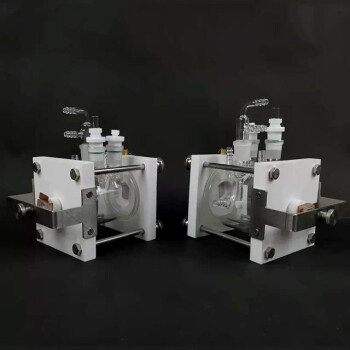
Flat Corrosion Electrolytic Electrochemical Cell
Discover our flat corrosion electrolytic cell for electrochemical experiments. With exceptional corrosion resistance and complete specifications, our cell guarantees optimal performance. Our high-quality materials and good sealing ensure a safe and durable product, and customization options are available.

Optical Water Bath Electrolytic Electrochemical Cell
Upgrade your electrolytic experiments with our Optical Water Bath. With controllable temperature and excellent corrosion resistance, it's customizable for your specific needs. Discover our complete specifications today.

Electrolytic Electrochemical Cell Gas Diffusion Liquid Flow Reaction Cell
Looking for a high-quality gas diffusion electrolysis cell? Our liquid flow reaction cell boasts exceptional corrosion resistance and complete specifications, with customizable options available to suit your needs. Contact us today!

PTFE Electrolytic Cell Electrochemical Cell Corrosion-Resistant Sealed and Non-Sealed
Choose our PTFE Electrolytic Cell for reliable, corrosion-resistant performance. Customize specifications with optional sealing. Explore now.
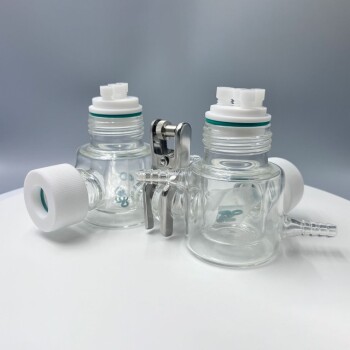
H-Type Double-Layer Optical Electrolytic Electrochemical Cell with Water Bath
Double-layer H-type optical water bath electrolytic cells, with excellent corrosion resistance and a wide range of specifications available. Customization options are also available.

Super Sealed Electrolytic Electrochemical Cell
Super-sealed electrolytic cell offers enhanced sealing capabilities, making it ideal for experiments that require high airtightness.

Electrolytic Electrochemical Cell for Coating Evaluation
Looking for corrosion-resistant coating evaluation electrolytic cells for electrochemical experiments? Our cells boast complete specifications, good sealing, high-quality materials, safety, and durability. Plus, they're easily customizable to meet your needs.

Lab Electrochemical Workstation Potentiostat for Laboratory Use
Electrochemical workstations, also known as laboratory electrochemical analyzers, are sophisticated instruments designed for precise monitoring and control in various scientific and industrial processes.

RRDE rotating disk (ring disk) electrode / compatible with PINE, Japanese ALS, Swiss Metrohm glassy carbon platinum
Elevate your electrochemical research with our Rotating Disk and Ring Electrodes. Corrosion resistant and customizable to your specific needs, with complete specifications.

Rotating Platinum Disk Electrode for Electrochemical Applications
Upgrade your electrochemical experiments with our Platinum Disc Electrode. High-quality and reliable for accurate results.
Related Articles

The Invisible Architecture of Accuracy: Optimizing the Five-Port Electrolytic Cell
Master the critical pre-use protocols for five-port water bath electrolytic cells. Learn how meticulous preparation ensures reproducible electrochemical data.

The Architecture of Precision: Mastering the Five-Port Water Bath Electrolytic Cell
Mastering the electrolytic cell is not just about chemistry; it is about discipline. Learn the systematic approach to preparation, operation, and maintenance.

The Fragile Vessel of Truth: A Maintenance Manifesto for Electrolytic Cells
Data integrity relies on equipment health. Discover the psychological and technical art of maintaining five-port electrolytic cells for reproducible science.

The Silent Dialogue: Mastering Control in Electrolytic Cells
Electrolysis is a non-spontaneous act requiring precise control. Learn to interpret the interplay of voltage, current, and physical phenomena for safer lab results.

The Fragility of Precision: Mastering the Integrity of Five-Port Electrolytic Cells
Prevent leaks in electrolytic cells through systematic inspection and proper assembly. A guide to mastering experimental seal integrity and reliability.

The Symphony of Coefficients: Why Your Electrolytic Cell Cannot Be a Monolith
Glass withstands heat; PTFE does not. Understanding the thermal conflict in five-port electrolytic cells is key to preventing equipment failure.

The Architecture of Precision: Why the Invisible Details Define Electrochemical Success
Master the art of pre-use inspection for electrolytic cells. From physical integrity to electrode purity, learn why the invisible details dictate experimental safety.

The Silent Variable: Engineering Reliability in Electrolytic Cells
Data accuracy depends on equipment integrity. Learn the engineering protocols for maintaining electrolytic cells to prevent systemic error.

The Architecture of Precision: Mastering Electrolytic Cell Maintenance
Reliable data starts with disciplined maintenance. Discover the psychological and technical approach to preserving electrolytic cells for peak performance.

The Transparency Paradox: Mastering the Fragile Art of Electrolytic Cells
Glass electrolytic cells are precision instruments, not simple containers. Learn the systematic approach to handling glass to ensure safety and data integrity.

The Unseen Variable: Mastering the Electrolytic Cell Inspection
Precision in electrochemistry begins before the current flows. Discover the critical pre-use checks for electrolytic cells that ensure safety and data integrity.

The Thermodynamics of Patience: Preventing Electrolytic Cell Overload
Overloading an electrolytic cell isn't just an error; it's a systemic failure. Learn the physics of safety, the risks of excess energy, and how to maintain control.